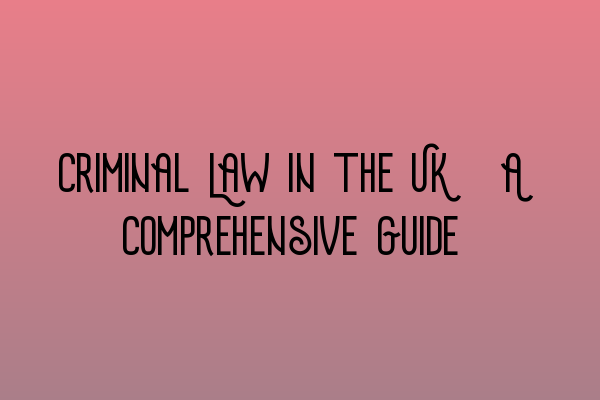Criminal Law in the UK: A Comprehensive Guide
Welcome to SQE Criminal Law & Practice Law UK! As a leading solicitor firm specializing in criminal law, we are here to provide you with a comprehensive guide to criminal law in the UK. Whether you are a law student, aspiring lawyer, or simply interested in the workings of the criminal justice system, this guide will help you understand the key concepts and principles of criminal law.
Overview of Criminal Law
Criminal law is a branch of law that deals with behaviors that are deemed harmful or threatening to society. It encompasses a wide range of offenses, from minor infractions to serious crimes. The purpose of criminal law is to maintain order, protect individuals and property, and uphold justice.
When a person commits a criminal offense, they may face legal consequences, such as fines, probation, imprisonment, or even the death penalty in certain cases. It is essential to understand the different elements of a criminal offense and the burden of proof required to secure a conviction.
Types of Criminal Offenses
In the UK, criminal offenses are categorized into two main types: summary offenses and indictable offenses. Summary offenses are minor offenses that are usually tried in a Magistrates’ Court, while indictable offenses are more serious crimes that are typically heard in a Crown Court.
Some common criminal offenses include theft, assault, burglary, fraud, drug offenses, sexual offenses, and homicide. Each offense has its own elements that must be proven beyond a reasonable doubt for a conviction.
The Criminal Justice System
The criminal justice system in the UK is a complex and multi-faceted process that ensures fairness, transparency, and adherence to the rule of law. It involves several key players, including the police, prosecution, defense, and judiciary.
The police have the duty to investigate alleged criminal offenses, gather evidence, and make arrests. Once the police have gathered sufficient evidence, they may proceed with charging the suspect. The prosecution, represented by the Crown Prosecution Service (CPS), then takes over the case and presents it in court.
The defense is responsible for representing the accused and ensuring their rights are protected throughout the legal proceedings. The judiciary, comprising judges and magistrates, presides over the trial, decides on guilt or innocence, and determines the appropriate sentencing.
Legal Defenses
In criminal law, defendants have the right to mount a legal defense to challenge the prosecution’s case. There are various legal defenses that can be raised, depending on the circumstances of the offense. Some common defenses include:
- Factual Defenses: These defenses aim to prove that the defendant did not commit the crime in question.
- Legal Defenses: These defenses focus on technicalities or legal principles to dispute the legality of the prosecution’s case.
- Affirmative Defenses: These defenses concede that the defendant committed the act but claim they should not be held criminally liable due to specific circumstances.
It is important to consult with an experienced criminal defense solicitor to understand the best defense strategy for your case.
Legal Resources and Preparation for Legal Exams
If you are studying law or preparing for legal exams, it is crucial to have access to reliable legal resources and courses. At SQE Criminal Law & Practice Law UK, we offer comprehensive preparation courses for both SQE 1 and SQE 2 exams.
For SQE 1 exam preparation, we recommend our SQE 1 Preparation Courses to ensure you have a solid foundation in all the essential areas of law. Additionally, you can enhance your knowledge and boost your exam performance by practicing with our SQE 1 Practice Exam Questions and SQE 1 Practice Mocks FLK1 FLK2.
If you are preparing for the SQE 2 exam, we offer specialized SQE 2 Preparation Courses that cover the key areas of criminal law and practice. Our team of experienced solicitors will guide you through the intricacies of criminal law and help you develop the necessary skills to succeed in your exams.
Stay Informed with SRA SQE Exam Dates
Aspiring solicitors must stay informed about the upcoming SRA SQE Exam Dates. It is essential to plan your study schedule and make sure you are adequately prepared for the exams. For information on the latest exam dates and registration process, visit our article on SRA SQE Exam Dates.
We hope this comprehensive guide to criminal law in the UK has provided you with valuable insights into the key aspects of this important field. Remember to consult with a qualified solicitor for any legal advice or assistance you may require. Stay tuned for more informative articles from SQE Criminal Law & Practice Law UK!
